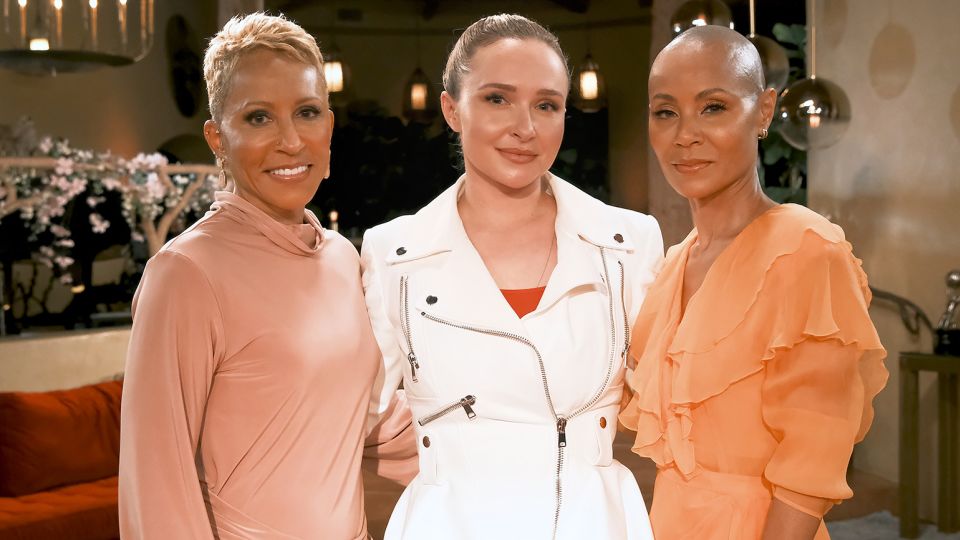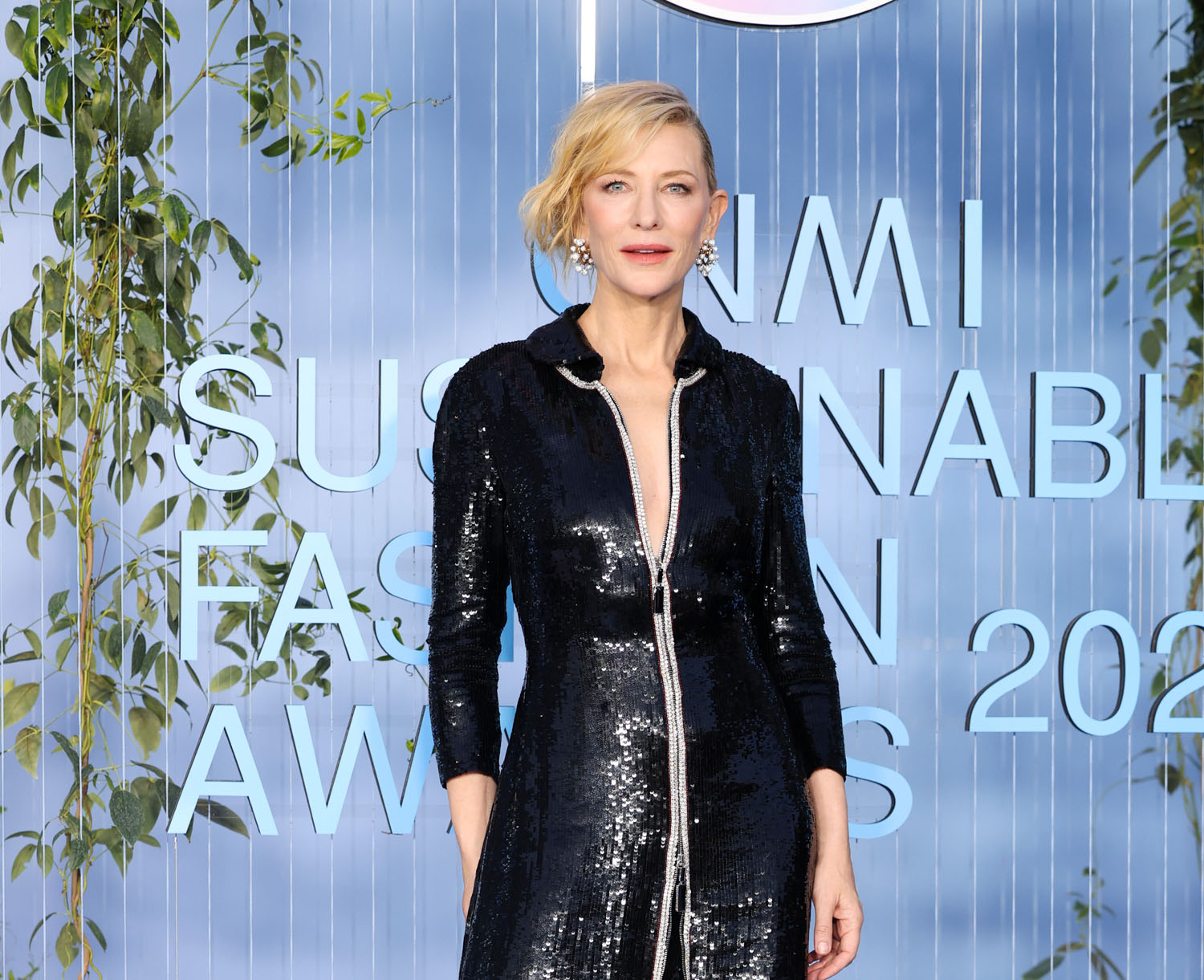Hayden's guilt and Jada's support



Jada Pinkett-Smith’s web series, Red Table Talk, is once again proving to be the place to go to let it all out. The show’s most recent episode featured Hayden Panettiere. She made revelations about everything from her early start in Hollywood to her use of “happy pills” as a teen star to her bout with post-partum depression after the birth of her daughter, Kaya. She also clarified how her very public custody arrangement that saw her daughter move away from her at age three to live in Ukraine with her father actually transpired.
Surrounded by the usuals, Jada and her mom, Adrienne Banfield-Norris, guest host Kelly Osbourne also joined in on the conversation. Kelly was a great fit as a guest host because both she and Hayden had similar early lives. They were both thrust into fame at a young age and could relate to each other on the pressure that came from being a child and teen star.
Hayden began the conversation talking about her early life, eventually describing her gig as a Neutrogena girl, a role she held onto for a decade starting at 16. She discussed having to sign a moral clause – a contract that sets out to ensure a spokesperson doesn’t behave in a way that damages a brand’s image – and said things became complicated when she was caught smoking a cigarette and doing a host of other activities that were explicitly banned in her contract.
“It’s a lot for a young person to have to deal with,” Adrienne chimed in.
A montage in the show emphasized the increasing pressure that was put on Hayden after she landed a starring role in the show Heroes – which set the stage for her accepting “happy pills”, something given to her by a trusted team member to help her with her energy levels at age 16.
“It must’ve been something similar to Adderall,” she said, saying she never thought of it as a drug or something bad and that it was effective in helping her to feel happy, energized and excited for press appearances. She found such relief in it that she sought some for personal use.
When the conversation moved onto her experience with post-partum depression, Kelly recalled seeing a close friend go through a bout so severe that it prevented her from being able to hold her baby.
“I just remember all of our friends and how judgemental they were about it and how many fingers were pointed at her,” she said to Hayden.
Hayden says she dealt with it by reaching for a bottle, something she saw a lot of growing up.
During her role on Nashville, a show I loved and thoroughly enjoyed, she describes having to act out things that were happening in her real life. Her character was reflecting her own experiences with alcohol, becoming pregnant and post-partum depression. “By the time I got home, I didn’t want to sit there with my own feelings and work them out,” she said.
Then, she moved onto talking about her custody arrangement. Hayden says she initially signed papers that granted her ex full custody of their daughter, under the stipulation that they would still be sharing time with her. However, after a routine visit with Hayden, her daughter went back to her dad’s and soon after, Hayden found out that he had moved her to Ukraine – a country where his family holds a lot of notoriety and political power.
When asked about making the decision to initially sign those papers, she said: “As mothers, as you know, sometimes we have to make decisions that weigh on us. At the time I felt horribly guilty, but I tried to tell myself, ‘If I’m not okay, if I’m not good, then I cannot be the best mom to you.’”
I felt seen in this moment. Today is my daughter’s fifth birthday. Sitting and reflecting on the last five years, there’s this weird mix of joy, excitement, relief that we’ve made it this far. But there’s also a sense of guilt. We’ve moved a lot since I left her dad. She’s been happy through and through but part of me wonders if this is all going to manifest itself into some unhealed childhood trauma in a few years.
Then, there’s the fact that I’m really only a part-time parent. That’s difficult to even type. Her dad and I share custody of her. So I have her for one week, he’s got her for the other. Most of my friends don’t have kids. And the ones that do are almost always with theirs. I always dread the question of being asked where she is, because I feel like the optics of being a mom that spends a week away from her kid at a time are bad.
I counter this with the fact that I genuinely enjoy my time away from her. While I’m not recovering from addiction like Hayden was during this time, I do use the time to work on being “okay”, to work on being “good”. I get to write. I get to go to the gym. I get to travel. I get to sleep in. Sometimes, though, all of that just makes me feel even more guilty. Because aren’t moms supposed to enjoy motherhood so much that we don’t want to be away from our kids? I know that the answer to that is no. But the pressure to feel that way is always there in the undertone.
Lately, the only thing that saves me is knowing how much more of a present mom I am when I have her. Having that time to rest and recharge and take care of all the administrative crap that can come up in life and chip away at the never-ending to do list while she’s gone frees me up to be hers, wholly, when she’s back in my care. Because of that, I soak up and drink in all the moments I can, because I get them 50% less than most moms. So hearing that Hayden, a celebrity that I grew up watching on the big screen, is also experiencing some of the same guilt, though in a very different way, makes me feel less alone in my very strange motherhood journey.
This is what Red Table Talk does, though. It makes guests and viewers feel less alone. It offers celebrities a unique opportunity to tell their stories in their own way and in a non-traditional format. There is no studio audience. There is no massive production team. It’s an intimate setting in which you can reveal whatever you’re comfortable revealing.
That’s why it’s been the place to have heavy conversations. Jordyn Woods, who appeared on the show in 2019, chose to go there to tell her side of the story about the Tristan Thompson cheating scandal (the first one, because as we know, there have been a few).
Kristin Davis went on the show to discuss white people adopting Black children. Ellen Pompeo sat down to discuss interracial relationships. And for Black guests, it’s been the site of conversations ranging from being abused by R. Kelly to being Black and gay in America.
Before Hayden appeared at the table for her conversation with the ladies, Kelly Osbourne even took a moment to reflect on how her time on the show helped her transform her life.
“Coming on this show the last time helped me so much,” Kelly said, reflecting on her RTT appearance in June of 2021. “I got honest because I felt safe and from there I decided to go back to treatment and it changed my life.”
“I don’t know what it is about you ladies but you allow a safe space for someone to come in and just lay it all out,” she said. “I did that and it was like therapy. I wanna be the person I was on Red Table everyday. And I did it,” she continued on.
Do you hear that? She says she felt safe. Safety is not a feeling generally granted to celebrities. But somehow, sitting down at the red table, bare of their security team, their PR people, and all of the other layers that come with being famous, allows them to speak their truths and feel better as a result of that.
A while ago I wrote about Loretta Devine and how much she embodies the image of that Black, motherly figure that’s always checking to make sure you’ve eaten. In their own way, Jada, Adrienne and yes, even Willow offer that. First, they are three generations of women who have had their own very public experiences and have been open and transparent about them. But especially because they sit and validate the experiences and the feelings of the guests that sit across from them.
During this episode, I couldn’t help but admire the support that came in even the smallest instances. Like the one I mentioned above about Adrienne, decades older than Hayden, asserting that her moral clause must have been a tough thing to be bound to as a young star. Or when Jada pointed to how vulnerable she must have been when she was given those happy pills.
These women host this show to support people as they tell their stories. There’s no fine print. There’s no shade about it. They just want to provide a safe space for people to talk.
All of this makes me think back to how unfairly Jada was treated after the Oscars slap fiasco. Variety had an interesting report that showed the damage done to her public image in the four months after the awards show. Citing information from Q Scores, a widely-used industry tool meant to measure the star power and appeal of celebrities, the publication asserted that her positive score, already considered low at 13, fell even lower to 6, and her negative score jumped from 29 to 44.
Why is that? How could such damage be done to her public image when all she really did was not engage?
We know why. Black women are often the casualty of instances that they may not have had a direct hand in. But if there’s an opportunity to express dislike for a Black woman, a lot of people are going to take it. I point back to Jordyn Woods for example, who became a target for the Kardashians and their tenacious fanbase when rumours swirled that Tristan Thompson made a move on her. She was immediately removed from the family circle while he stuck around for a while longer, proving to be absolute filth and going on to impregnate Maralee Nichols while still partnered with Khloe.
There’s also something to be said about the fact that stars come on this show and discuss traumatic experiences with their mothers. In early September, Jennette McCurdy appeared on the show to discuss her book, I’m Glad My Mom Died. The episode after that discussed parental alienation, and in a May episode, the show discussed how mothers damage their daughters.
I’ve been listening to podcasts a lot lately. And I mean a lot. I consume about 4-5 episodes per day. One common thread between these podcasts is how much our relationships with our mothers inform the rest of our lives. So for stars who have had traumatic experiences with their moms, it seems like they take huge strides healing that mother wound just by feeling seen and validated by these women, these mothers, who biologically aren’t theirs. But for a wrinkle in time, they become the maternal voice and support that many of them lacked.
After the Oscars, and even moving forward, society really owes Jada the same empathy she grants to guests on her show. Each episode, she proves her softness, her wisdom, her own empathy and her ability to heal intergenerational wounds by listening, supporting and validating. We’re all better for it.

